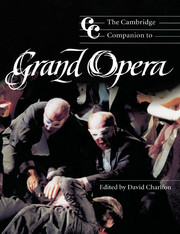Book contents
- Frontmatter
- 1 Introduction
- Part I The resourcing of grand opera
- 2 The ‘machine’ and the state
- 3 Fictions and librettos
- 4 The spectacle of the past in grand opera
- 5 The chorus
- 6 Dance and dancers
- 7 Roles, reputations, shadows: singers at the Opéra, 1828–1849
- Part II Revaluation and the twenty-first century
- Part III Grand operas for Paris
- Part IV Transformations of grand opera
- Notes
- Select bibliography
- Index
4 - The spectacle of the past in grand opera
from Part I - The resourcing of grand opera
Published online by Cambridge University Press: 28 November 2011
- Frontmatter
- 1 Introduction
- Part I The resourcing of grand opera
- 2 The ‘machine’ and the state
- 3 Fictions and librettos
- 4 The spectacle of the past in grand opera
- 5 The chorus
- 6 Dance and dancers
- 7 Roles, reputations, shadows: singers at the Opéra, 1828–1849
- Part II Revaluation and the twenty-first century
- Part III Grand operas for Paris
- Part IV Transformations of grand opera
- Notes
- Select bibliography
- Index
Summary
Shifting perspectives
Among the most long-lasting cultural effects of the French Revolution was a sense among the population of Europe of separation from its past. By and large, the eighteenth century experienced continuity with the past, in particular an affinity with the values of classical civilisation, but after the depredations of the Revolution and the Napoleonic Wars, ‘all that had gone before seemed to belong to a world forever lost’. The consequence of this alienation from the past was not, however, the embracing of an exclusively modernist culture. On the contrary, at no time in European history have the forms, styles, and modes of the past been so assiduously cultivated as they were in the hundred years following the Revolution. In all phases of artistic activity, the past was recaptured and preserved, partly to deny its loss, partly to escape from the realities of contemporary life. The nineteenth century also identified with history periods that either offered parallels to unstable aspects of its own social and political life or reflected values important to contemporary society.
The historicist tendency that so characterises post-revolutionary culture had already begun to reveal itself in eighteenth-century Europe in, for example, the pre-Romantic movements of Gothicism in England and Sturm und Drang in Germany. In Paris too there were signs in the latter half of the eighteenth century that theatres were beginning to break away from the conventions of classical scenography in the cause of greater realism.
- Type
- Chapter
- Information
- The Cambridge Companion to Grand Opera , pp. 58 - 75Publisher: Cambridge University PressPrint publication year: 2003
- 6
- Cited by



